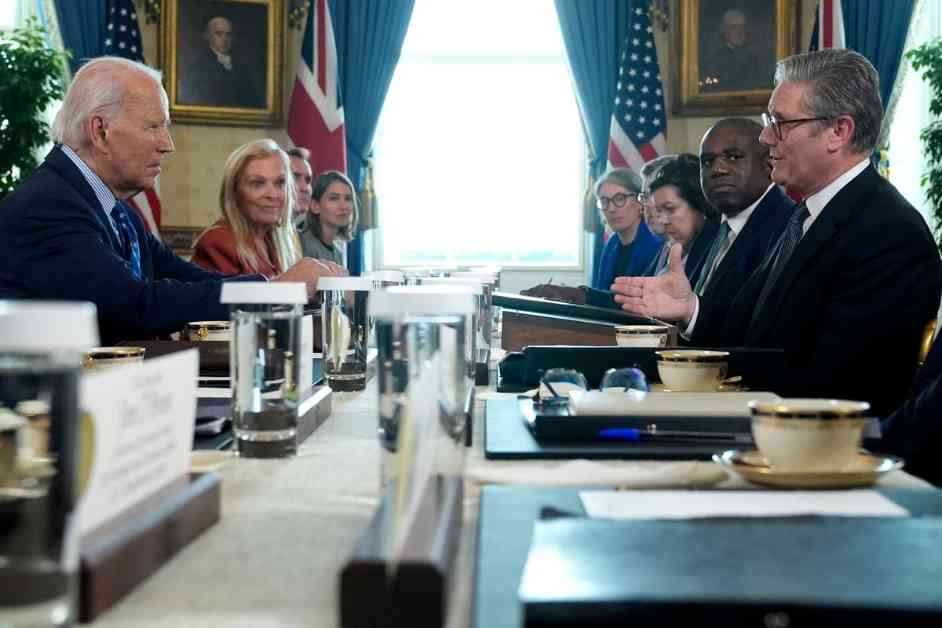US President Joe Biden made headlines during a bilateral meeting with UK Prime Minister Sir Keir Starmer in Washington when he scolded a Sky News reporter for asking about Russian President Vladimir Putin’s threat of war over Kyiv’s use of long-range missiles. The tense exchange occurred as Mr. Biden and Sir Keir discussed the possibility of allowing Ukraine to launch Western missiles deep inside Russian territory. This move has raised significant concerns about the potential escalation of the conflict between Russia and NATO.
Challenging Putin’s Threats
When James Matthews, a US correspondent for Sky News, questioned President Biden about Putin’s warning that allowing Ukraine to use Western missiles would lead to a conflict with NATO, Biden responded sharply, commanding Matthews to be quiet as he tried to speak. The exchange highlighted the delicate diplomatic balance the US and its allies must navigate in supporting Ukraine while avoiding direct confrontation with Russia.
The Debate Over Western Missiles
Ukrainian President Volodymyr Zelensky has been advocating for months for Western allies to allow his military to use long-range missiles, such as US ATACMS and British Storm Shadow missiles, to strike Russian targets responsible for daily attacks on Ukraine. However, Putin’s warning that such actions would provoke a war with NATO has added a new layer of complexity to the situation.
President Putin’s assertion that the programming of Western missiles would involve NATO military personnel raises the stakes for all parties involved. The prospect of Russia being drawn into direct conflict with NATO over the use of these missiles underscores the high stakes of the situation in Ukraine and the need for careful diplomatic maneuvering.
US Response and Considerations
In response to questions about the possibility of allowing Ukraine to use British missiles inside Russia, President Biden indicated that his administration was still “working that out.” The US has provided Ukraine with the longest-range version of ATACMS, a ballistic missile capable of traveling 190 miles, but concerns remain about the potential consequences of using such weapons in the conflict.
Britain has supplied Ukraine with Storm Shadow missiles, which have a range of approximately 155 miles, significantly greater than the missiles currently used by Ukraine. However, restrictions prevent Ukraine from using these missiles to target key locations inside Russia, further complicating the debate over the use of Western firepower in the conflict.
The UK has played a significant role in supplying Ukraine with military support, including missiles like the Storm Shadow. The decision to provide such advanced weaponry reflects the international community’s commitment to supporting Ukraine in its fight against Russian aggression. However, the constraints on the use of these missiles underscore the challenges of balancing support for Ukraine with the need to prevent further escalation of the conflict.
Risk of Escalation and Nuclear Concerns
President Putin’s warning that allowing Ukraine to use Western missiles could lead to a conflict with Russia has raised concerns about the potential for a wider escalation of the conflict. The deployment of long-range missiles into Russian territory could provoke a significant response from Moscow, potentially leading to a dangerous and unpredictable situation.
The fear of Russia’s possible deployment of hypersonic nuclear weapons in response to the use of Western missiles underscores the high stakes involved in the conflict. The specter of nuclear escalation adds a new level of urgency to the diplomatic efforts to resolve the crisis in Ukraine and prevent a wider conflict from erupting.
In conclusion, the debate over the use of Western missiles in the conflict between Ukraine and Russia highlights the complex geopolitical dynamics at play in the region. President Biden’s rebuke of the Sky News reporter for asking about Putin’s threats underscores the sensitivities surrounding the issue and the need for careful diplomacy in navigating the crisis. The international community must continue to engage with all parties involved to find a peaceful resolution to the conflict and prevent further escalation that could have devastating consequences for the region and the world.












